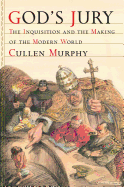
God's Jury is an exploration of the Inquisition's many incarnations--not just the Spanish, but also the medieval and Roman versions, as well as more modern analogues--but it's most fascinating when Cullen Murphy (Are We Rome?) describes how we know what we know about the Inquisition. Murphy has a talent for character sketches, and some of his most intriguing introduce us to archivists and academics who've devoted years of their lives to the Holy Office's considerable stash of papers. We meet scholars like Carlo Ginzburg, an historian whose initial request promoted the opening of the 17th-century Roman Inquisition's archives from the "Archivio Segreto" (which is not so much "secret" as private to the pontiff), and Monsignor Alejandro Cires Gimenez, the friendly theologian who serves as the chief archivist for the Congregation for the Doctrine of Faith. They watch over the priceless manuscripts from Galileo's trial, as well as relatively banal documents like an itemized expense report from a 1323 heretic burning. Murphy also delves into the history of these papers, reporting, for example, on how Napoleon's attempt to build a massive, centralized European archive resulted in the disappearance of everything related to Giordano Bruno.
Murphy covers the better-known chapters of the Inquisition's history, from the attack on the Cathar heretics to the persecution of Jews in Spain, but he also folds in less well-known moments, like the suppression of the benandanti: rural peasants in 16th- and 17th-century northern Italy whose fertility rituals, in which they walked the fields at night battling witches and spirits to ensure a bountiful harvest, led to their prosecution as witches. The sheer variety of prosecutable offenses is striking, and it's the inclusion of rarer instances like these, plus Murphy's eye for an eccentric, that makes God's Jury distinctive. --Kelly Faircloth, freelance writer

